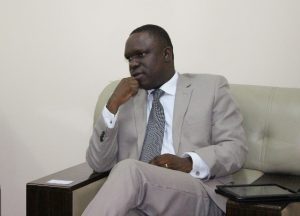(Photo credit: Willem Van Cotthem 2016- Smallholder Sesame farmer in Tanzania)
With the COVID-19 crisis disrupting regional and global trade, the Development Reimagined team spoke with H.E Mbelwa Kairuki, Tanzania’s ambassador to China, to get his take on Sino-Tanzania trade and what he and his team are doing to try to respond.
DEVELOPMENT REIMAGINED: Ambassador Kairuki, can we ask you for a brief overview of the Tanzania-China relationship and your priorities in driving it forward?
AMBASSADOR KAIRUKI: Since the establishment of diplomatic relations 56 years ago, China and Tanzania have enjoyed long-term healthy and steady cooperation. The famous Chinese-built Tanzania-Zambia (TAZARA) railway has, of course, been one of the key achievements of our relationship. China has been our largest foreign investor with total investment reaching over $7 billion by 2019, and trade volume reached $3.9 Billion in the same year. However, considering the available opportunities in China and Tanzania, there is still a big room to increase our trade and investment volume. That is the main task of our embassy in Beijing, and so far, we are progressing well.
DEVELOPMENT REIMAGINED: That is a critical observation, Mister Ambassador, and I hope we can discuss more on investment another time. For now, could you tell us more about Tanzania- China trade over time, particularly for agricultural products, and how that has changed, if at all?
AMBASSADOR KAIRUKI: First, let me put Tanzania’s trade-in context. Globally, we are the 22nd largest exporter within the African region, accounting for about 4% of global exports. That said, there are some particular products we are well known for and ahead of others. For example, we are the continent’s 4thlargest producer of gold. We are also one of the ten largest sunflower producing countries globally with a production share of 2.4%. We are trying to become Africa’s largest cashew nut exporter – right now, we are behind Nigeria and Cote D’Ivoire.
EVELOPMENT REIMAGINED: So how does China factor in? Is China a big market for Tanzanian agriculutral products?
AMBASSADOR KAIRUKI: The vast majority of Tanzania’s exports go to other African countries. Overall, China ranks 5th as an export destination. Our exports to China- account for 3.9% of our total exports. Although a 3.9% share might seem small as a percentage, coupled with expected growth in the Chinese market, it makes China a significant export destination for us. Most importantly, China demands some unique and interesting products we don’t see markets for elsewhere. For example, sesame, which is a popular ingredient in Chinese cooking. China’s market accounts for over a third of global sesame demand. As a result, China is our top export destination for sesame seeds – accounting for 80% of our exports of this product, and oilseeds overall are our 6th most important export to China, behind gold, copper products, tobacco, and so on. In 2019, we made $164.5 million from our exports of sesame to China alone.
In the last two years, we have intensified the promotion of Tanzania’s coffee and cashew nuts in the Chinese Market. From January to August 1000 tones of Cashew Nuts were imported from Tanzania. We are hopeful that the number will increase significantly between October to December because, in October, the harvesting season will begin in Tanzania. Also, the demand in China will increase as we are approaching the new Chinese New Year. We are now closely working with the China Chamber of Commerce and Export of Foodstuffs, Native Produce, and Animal Byproducts to link Chinese buyers with Tanzanian suppliers of those two products. In October, we are looking forward to signing an Agreement on Phytosanitary Requirement for the Export of Soybean from Tanzania to China.That will undoubtedly enable Tanzania’s exports to China to increase. We are also working closely with the Hunan Province Department of Commerce to promote coffee and Cashew’s importation from Tanzania. As you know, Hunan Province was mandated by the Chinese Central Government to spearhead China Africa Trade Initiative, and it is the permanent host of the China Africa Economic and Trade Expo. This year, we launched Africa Coffee Street and African Cocoa Marketing Centre at the Hunan Gaoquiao Grant Market.
All in all- for us, various products – outside of mining – are essential. Especially with the challenges to tourism being presented by COVID19, the agriculture sector remains critical in Tanzania. 67% of our workforce is engaged in agriculture.
DEVELOPMENT REIMAGINED: How has trade between Tanzania and China been affected by COVID19, if at all?
AMBASSADOR KAIRUKI:
Before COVID19, overall trade between China and Tanzania had been growing. The only challenge has been trading Imbalance. For instance, for Tanzania, for every dollar of goods we export to China, we usually import 10 dollars of goods from China. That compares to a trade balance of around 1: 1.8 dollars globally. To address this challenge, we are shifting the composition of our trade towards more added value products– less raw materials than processed industrial and consumer goods. I am happy that for some products like Cashew nuts, the Chinese market demand more processed Cashew than raw.
However, the COVID19 outbreak has had repercussions on our trade with China. While we were happy that our sesame exports to China increased by 35 percent, the price of sesame seeds in the Chinese market fell by 30%. Some of the Chinese Government’s COVID19 control measures harmed trading activities between our two countries. For example, when all the airlines were required to maintain only one air route to China and operate no more than one flight a week, it impacted trading activities. Also, the suspension of foreign nationals’ entry to China affected many of our traders’ business engagements in China. Our National Carrier- Air Tanzania, had to postpone their plans to start direct flights from Dar-es-Salaam to Guangzhou.
DEVELOPMENT REIMAGINED: As China manages and recovers from COVID-19, is there now an opportunity to reimagine trade with China?
AMBASSADOR KAIRUKI: COVID19 has been a double-edged sword. On one end, it has exposed the deficiencies in our structures, but it also presents opportunities. It has allowed us to look at our domestic food, energy, and other national security aspects, our value chains, and identify the gaps. We must use COVID19 as an impetus to improve and negotiate better outcomes with our partners.
Fortunately, the Chinese Government is committed to increasing trade cooperation with Africa, as evidenced by the 2018 FOCAC summit in Beijing. China announced the launch of the Trade Facilitation Initiative and committed to rising imports of African non-resource products. In 2019, China launched the China-Africa Economic and Trade Expo in Hunan – where Tanzania was among the guest countries, and I know Development Reimagined also brought brands from all over Africa to exhibit – including Inua Naturals from Tanzania. Also, during the 2nd China International Import Expo in Shanghai, more than 10 African countries showcased their products to the Chinese market.
DEVELOPMENT REIMAGINED: But is this enough? What is your ambition for the trade relationship with China as a development partner?
AMBASSADOR KAIRUKI: It’s up to both China and Tanzania. For Tanzania, we must continue to focus on opening untapped and under-tapped markets in China and investing more in processing and technologies for value-added, branded exports, consequently creating more jobs and further economic growth.
But China can also be more proactive. We are commemorating 20 years of FOCAC this year. In 2021, there will be another FOCAC Summit in Dakar in Senegal. We hope that China will continue to provide duty-free entry to all African agricultural and agro-processed products and fast-tracking agricultural product quality certification, a non-tariff barrier to trade.
But perhaps China could also commit now or then – with say $15 billion – to a new stimulus package – a COVID-19 trade fund to facilitate importation of non-resource products from Africa over the next three years. The funds could be disbursed as preferential loans or grants. Beneficiaries of such funds could be:
- Chinese and African research and higher learning institutions working to strengthen agriculture investment and technical assistance – with a particular focus on addressing supply-side constraints such as low productivity;
- Chinese and African Enterprises or joint ventures engaging in the production and value-added processing of agricultural products for export to China;
- Chinese and African enterprises to provide better information on agricultural and value-added product market demand in China.
These funds could be managed by a new institution – a China-Africa Trade Fund. Alternatively, the mandate of existing institutions such as CAD Fund could be extended to cover this, perhaps with a partnering African fund manager. By doing so, Africa’s commodities will fetch a more assured market and reasonable price.
I believe this is how we can together safeguard China’s and Africa’s common interest against adversity from the invisible enemy of COVID-19 and boost economic and trade cooperation in a genuinely win-win, balanced way.
Based on Our Discussion, What Does the Team at Development Reimagined Think Can Boost the Trade Relationship Post-COVID-19?
Ambassador Kairuki provides a useful overview of the trade issues he is dealing with right now, coming out of COVID-19 and with a view to “building back better”. We fully agree with and endorse not only the vision he, his government, and his team have for the future of trade with China but also his idea for a new fund, which could provide a practical model for other development partners to follow too, especially to meet the UN Sustainable Development Goals.
Too often, we see development partners trying to increase trade by making developing countries such as Tanzania change internally – to cut their red tape or remove other so-called in-country barriers to trade. But the lack of investment into added-value production at the higher-end of the supply chain and low demand for added-value products from African countries in more affluent markets is as much an impediment to trade. If Tanzania and China can show a new model that can work, co-owned and co-driven by both African and Chinese businesses and organizations from the start, we have real hope for “building forward” for the future, post-COVID19.
Special thanks to Chazha Ludo Macheng for research.
The Article was originally published on The China Africa Project Website on 9 October 2020
October 2020


